冀教版初中英语七年级下册第七单元第41课导学案设计(无答案)
- 格式:docx
- 大小:20.13 KB
- 文档页数:3
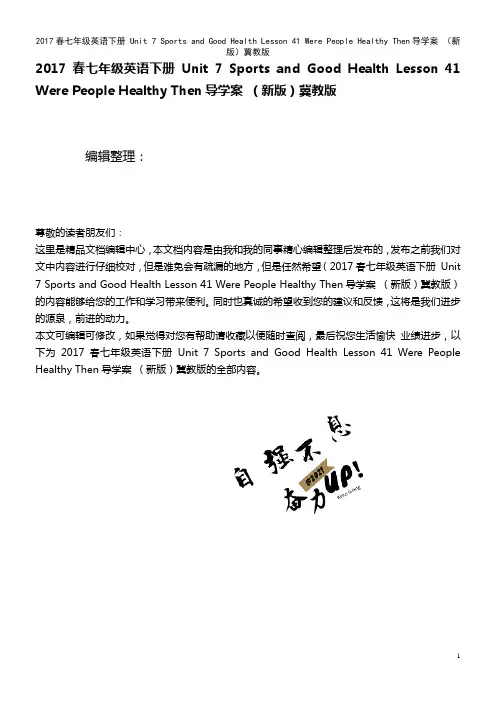
2017春七年级英语下册Unit 7 Sports and Good Health Lesson 41 Were People Healthy Then导学案(新版)冀教版编辑整理:尊敬的读者朋友们:这里是精品文档编辑中心,本文档内容是由我和我的同事精心编辑整理后发布的,发布之前我们对文中内容进行仔细校对,但是难免会有疏漏的地方,但是任然希望(2017春七年级英语下册Unit 7 Sports and Good Health Lesson 41 Were People Healthy Then导学案(新版)冀教版)的内容能够给您的工作和学习带来便利。
同时也真诚的希望收到您的建议和反馈,这将是我们进步的源泉,前进的动力。
本文可编辑可修改,如果觉得对您有帮助请收藏以便随时查阅,最后祝您生活愉快业绩进步,以下为2017春七年级英语下册Unit 7 Sports and Good Health Lesson 41 Were People Healthy Then导学案(新版)冀教版的全部内容。
Unit 7学习目标能力目标能够了解古代与现代的不同,能用英语简单描述周围的环境,号召同学们保护环境。
知识目标单词:nation hunt,spend, natural,短语: at that time; there be; spend; how long 的用法句子:1. Dena Morin and her grandfather, Mr. Morin,are fishing at the lake。
2. Our people always went finishing and hunting for food。
学法指导本课单词和短语较多,注意巩固音标,提前解决词汇任务。
有问题及时与老师沟通。
1. 预习课文,通读全文后画出重点句式,句子。
对疑问处做好标记2。
用所给单词的适当形式填空。
natural,health,read,fish,spenda.Doing more sports can make you .b. a book in the sun is not good for your eyes.c.They 2 hours in finishing their homework.d.My son likes to go 。
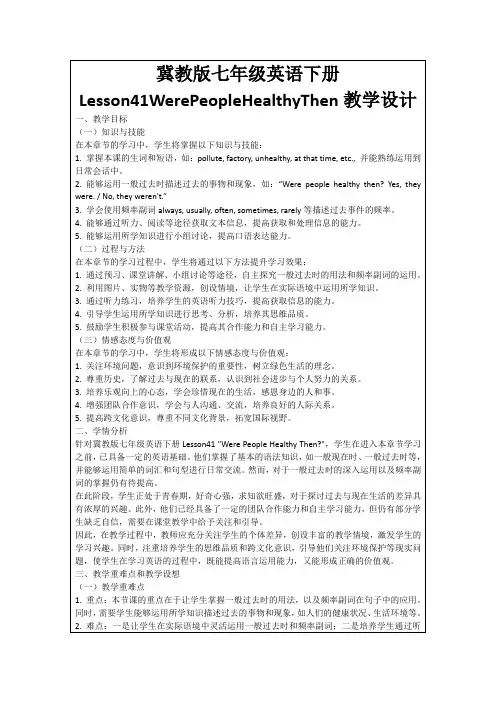
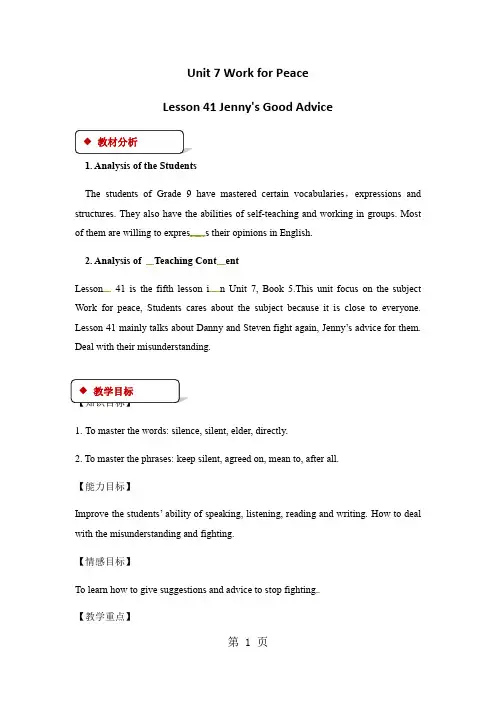
Unit 7 Work for PeaceLesson 41 Jenny's Good Advice1. Analysis of the StudentsThe students of Grade 9 have mastered certain vocabularies,expressions and structures. They also have the abilities of self-teaching and working in groups. Most of them are willing to expres s their opinions in English.2. Analysis of Teaching Cont entLesson41 is the fifth lesson i n Unit 7, Book 5.This unit focus on the subject Work for peace, Students cares about the subject because it is close to everyone. Lesson 41 mainly talks about Danny and Steven fight again, Jenny’s advice for them. Deal with their misunderstanding.1.To master the words: silence, silent, elder, directly.2. To master the phrases: keep silent, agreed on, mean to, after all.【能力目标】Improve the students’ ability of speaking, listening, reading and writing. How to deal with the misunderstanding and fighting.【情感目标】To learn how to give suggestions and advice to stop fighting.【教学重点】To master the words and phrases.【教学难点】To know about how to deal with the misunderstanding.Tape recorder, MultimediaStep 1. Warm-up1.Enjoy a picture abo ut fighting, and elicit the phrase “get into a fight”.2.Free talk: (1) What do you do when your friends misunderstand you?(2)When you get into a fight with a friend, which of you usually says sorry first?Step 2. Presentation1.Show the pictures of Jenny’s advice and ask students: Who are they? What happened?2.Explain the new words.3.Listen to the dialogue and answer the questions.(1)Is Danny free on Saturday afternoon?(2)Who else does Jenny invite?(3)Why does Jenny invite them?4.Check the answers.5.Explain the language points:agree to do“应允,愿意”。
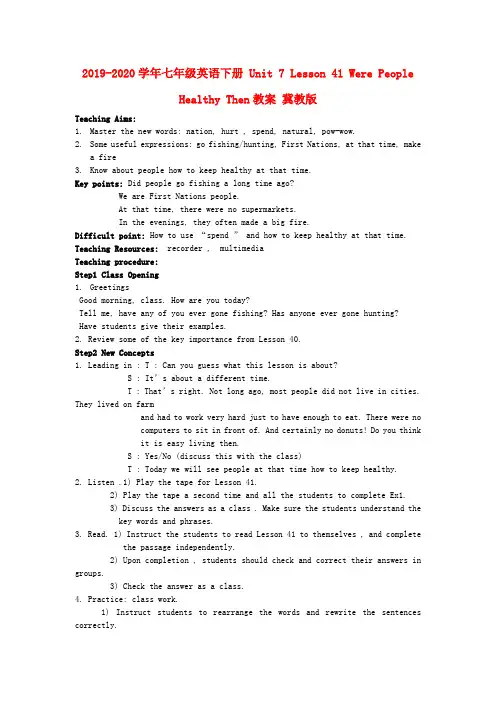
2019-2020学年七年级英语下册 Unit 7 Lesson 41 Were PeopleHealthy Then教案冀教版Teaching Aims:1.Master the new words: nation, hurt , spend, natural, pow-wow.2.Some useful expressions:go fishing/hunting, First Nations, at that time, makea fire3.Know about people how to keep healthy at that time.Key points: Did people go fishing a long time ago?We are First Nations people.At that time, there were no supermarkets.In the evenings, they often made a big fire.Difficult point: How to use “spend ” and how to keep healthy at that time. Teaching Resources: recorder , multimediaTeaching procedure:Step1 Class Opening1.GreetingsGood morning, class. How are you today?Tell me, have any of you ever gone fishing? Has anyone ever gone hunting? Have students give their examples.2. Review some of the key importance from Lesson 40.Step2 New Concepts1. Leading in : T : Can you guess what this lesson is about?S : It’s about a different time.T : That’s right. Not long ago, most people did not live in cities. They lived on farmand had to work very hard just to have enough to eat. There were no computers to sit in front of. And certainly no donuts! Do you thinkit is easy living then.S : Yes/No (discuss this with the class)T : Today we will see people at that time how to keep healthy.2. Listen .1) Play the tape for Lesson 41.2) Play the tape a second time and all the students to complete Ex1.3) Discuss the answers as a class . Make sure the students understand thekey words and phrases.3. Read. 1) Instruct the students to read Lesson 41 to themselves , and completethe passage independently.2) Upon completion , students should check and correct their answers in groups.3) Check the answer as a class.4. Practice: class work.1) Instruct students to rearrange the words and rewrite the sentences correctly.2) Upon completion ,have students present their answers for one question to the class.3) Review any problem words.5. Language points.Step 3:Let’s Do It. Do Ex4.Work in pairs. Life was different a long time ago. Talk about the differences between life then and life now.Step4:Class closingAssign homeworkWere People Healthy Then: Based on the lesson, have the students write a few sentences about what would be the best part of living long ago and what would be the worst part.。
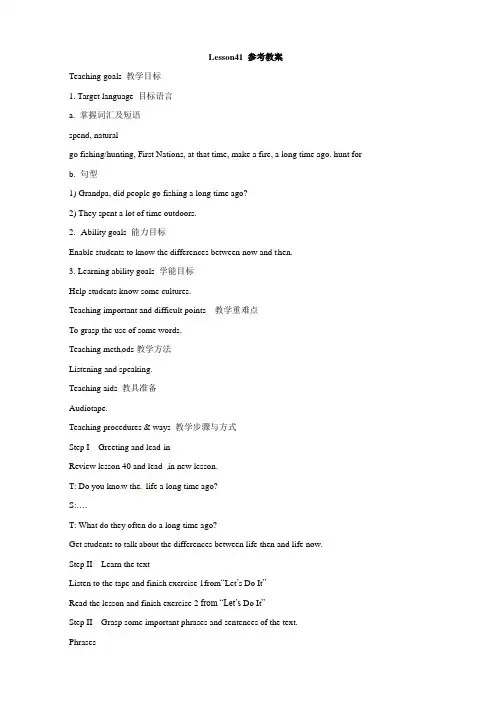
Lesson41 参考教案Teaching goals 教学目标1. Target language 目标语言a. 掌握词汇及短语spend, naturalgo fishing/hunting, First Nations, at that time, make a fire, a long time ago. hunt forb. 句型1) Grandpa, did people go fishing a long time ago?2) They spent a lot of time outdoors.2. Ability goals 能力目标Enable students to know the differences between now and t hen.3. Learning ability goals 学能目标Help students know some cultures.Teaching important and difficult points 教学重难点To grasp the use of some words.Teaching meth ods教学方法Listening and speaking.Teaching aids 教具准备Audiotape.Teaching procedures & ways 教学步骤与方式Step I Greeting and lead-inReview lesson 40 and lead in new lesson.T: Do you kno w the life a long time ago?S:….T: What do they often do a long time ago?Get students to talk about the differences between life then and life now.Step II Learn the textListen to the tape and finish exercise 1from“Let’s Do It”Read the lesson and finish exercise 2 from “Let’s Do It”Step II Grasp some important phrases and sentences of the text.Phrasesgo fi shing/hunting 去钓鱼/打猎at that time 在那个时候make a fire 生火a long time ago 很久以前hunt for 寻找Sentences1)Grandpa, did people go fishing a long time ago? 爷爷,在很久以前人们钓鱼吗?go fishing 意为“去钓鱼”,其构成形式为go+doing常见的词组还有:go swimming 去游泳;go skiing 去滑雪;go skating 去滑冰;go climbing mountain 去爬山2)At that time, there were no supermarkets. 那时候还没有超市。
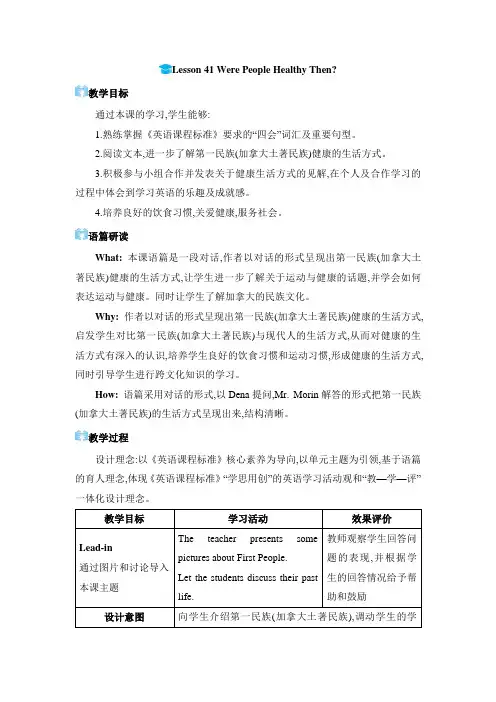
Lesson 41 Were People Healthy Then?教学目标通过本课的学习,学生能够:1.熟练掌握《英语课程标准》要求的“四会”词汇及重要句型。
2.阅读文本,进一步了解第一民族(加拿大土著民族)健康的生活方式。
3.积极参与小组合作并发表关于健康生活方式的见解,在个人及合作学习的过程中体会到学习英语的乐趣及成就感。
4.培养良好的饮食习惯,关爱健康,服务社会。
语篇研读What: 本课语篇是一段对话,作者以对话的形式呈现出第一民族(加拿大土著民族)健康的生活方式,让学生进一步了解关于运动与健康的话题,并学会如何表达运动与健康。
同时让学生了解加拿大的民族文化。
Why: 作者以对话的形式呈现出第一民族(加拿大土著民族)健康的生活方式,启发学生对比第一民族(加拿大土著民族)与现代人的生活方式,从而对健康的生活方式有深入的认识,培养学生良好的饮食习惯和运动习惯,形成健康的生活方式,同时引导学生进行跨文化知识的学习。
How: 语篇采用对话的形式,以Dena提问,Mr. Morin解答的形式把第一民族(加拿大土著民族)的生活方式呈现出来,结构清晰。
教学过程设计理念:以《英语课程标准》核心素养为导向,以单元主题为引领,基于语篇的育人理念,体现《英语课程标准》“学思用创”的英语学习活动观和“教—学—评”一体化设计理念。
续表板书设计Lesson 41 Were People Healthy Then?First Nations people↙↘Food Activities作业设计基础型作业:Review and recite the important points of this lesson. 实践型作业:Ask the students to talk about their own life.教学反思。
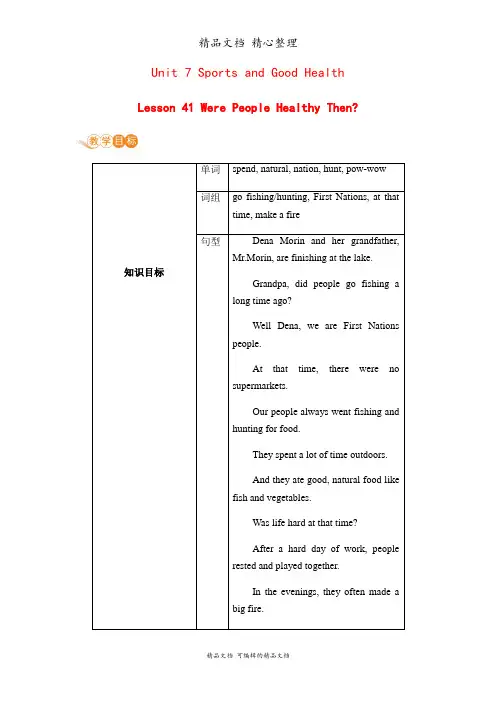
Unit 7 Sports and Good Health Lesson 41 Were People Healthy Then?单词spend, natural, nation, hunt, pow-wow1.掌握There be结构和一般过去时的用法。
2.了解好的生活方式对人们健康的影响。
正确使用本课的词和短语,分辨、会用spend, natural, nation, hunt, pow-wow, go fishing/hunting, First Nations, at that time, make a fire。
Step 1.Lead inLeading in 【情景1】Show some pictures of summer to the students.Ask them to talk about the pictures.Point to the pictures.Ask the students questions:T:What are these people doing in the picture?S1:They are fishing.T:What are those people doing in the picture?S2:They are hunting.T:What are the women doing?S3:They are planting crops and vegetables.T:What are the people doing in the picture?S4:Some people are playing the drums and others are dancing around the fire.Leading in 【情景2】Work in groups.Ask the students to talk about how to stay healthy.S1:How do we have a healthy life?S2:We must eat healthy food,fruit and vegetables.S3:We must do some exercise.S4:We must study hard, but at the same time, we need to relax.S5:Do we need to go fishing and hunting?S6:No, we don’t.We didn’t live in the past.S7:We should wash the fruit and vegetables to make them clean before eating.S8:We shouldn’t eat snacks.After a few minutes, ask the groups to give a speech in front of the class.Group 1:To stay healthy, we must eat healthy food, fruit and vegetables.We must study hard, but at the same time, we need to relax.We should wash the fruit and vegetables to make them clean before eating.We shouldn’t eat snacks.Step 2.Presentation1.Show the students pictures or objects and learn the new words and expressions in this part:spend, natural, nation, hunt, pow-wow, go fishing/hunting, First Nations, at that time, make a fire.T:What do you do on weekends?S9:I spend much time reading.T:Now read after me “spend”.S:Spend.T:Is natural food good for us?S10:Of course.T:Now read after me “natural”.S:Natural.2.Ask the students to work in pairs.Try to make a conversation with the new words and phrases.T:Try to make conversations with the new words and phrases.S11:Do you like going fishing?S12:Yes,I do.Fishing is interesting.S11:Do you like hunting?S12:No.We can’t hunt in the forest.S11:Can we make a fire and dance around it?S12:Of course.When we go camping, we often do that.Step 3.Practice1.Retell the story.Ask the students to retell the text.Ask a few students to try in class.2.Work in pairs.Create a new dialogue about healthy lifestyle.Ask a few pairs to act them out in front of the class.S13:What do you often do after school?S14:I often play basketball with my friends.What about you?S13:I often read books at home.3.Make sentences with the new words, expressions and grammars.Step 4plete Let’s Do It!Exercise 1 is listening part.We have finished it in class.Exercise 2 is about reading test.We have finished it in class.Exercise 3 is about rewriting the sentences using the proper form of “there be” of the text.Check the answers in class.Step 5.TaskPair work:Let’s Do It! Exercise 4.Work in pairs.Life was different a long time ago.Talk about the differences.Example:A:Today we buy food at the supermarket.But there were no supermarkets a long time ago.Where did people get food?B:People went fishing and hunting for food.They always ate good, natural food.Now people eat a lot of fast food.Ask the students to discuss in groups.Create more dialogues.After a few minutes, ask some groups to act their dialogues out in front of the class.1.The boy wants to have a (health) body.2.Did people (eat) meat a long time ago?3.He spent much time (read) in the library.4.We (rest) at home last weekend.5.She (dance) with her friends at the party.答案:1.healthy 2.eat 3.reading 4.rested 5.danced1.Remember the words and phrases in this lesson.2.Read the text after class.3.Prepare for the next lesson.。
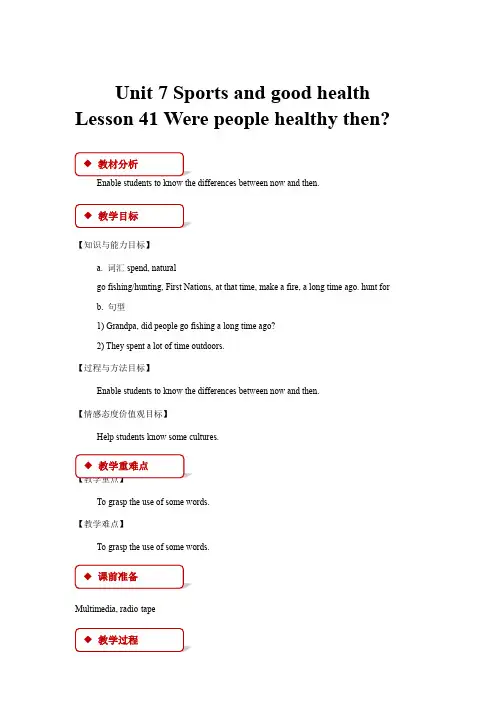
Unit 7 Sports and good healthLesson 41 Were people healthy then?Enable students to know the differences between now and then.【知识与能力目标】a. 词汇spend, naturalgo fishing/hunting, First Nations, at that time, make a fire, a long time ago. hunt for b. 句型1) Grandpa, did people go fishing a long time ago?2) They spent a lot of time outdoors.【过程与方法目标】Enable students to know the differences between now and then.【情感态度价值观目标】Help students know some cultures.To grasp the use of some words.【教学难点】To grasp the use of some words.Multimedia, radio-tapeStep I Greeting and lead-inReview lesson 40 and lead in new lesson.T: Do you know the life a long time ago?S:….T: What do they often do a long time ago?Get students to talk about the differences between life then and life now.Step II Learn the textListen to the tape and finish exercise 1from“Let’s Do It”Read the lesson and finish exercise 2 from “Let’s Do It”Step II Grasp some important phrases and sentences of the text.Phrasesgo fishing/hunting 去钓鱼/打猎at that time 在那个时候make a fire 生火a long time ago 很久以前hunt for 寻找Sentences1)Grandpa, did people go fishing a long time ago? 爷爷,在很久以前人们钓鱼吗?go fishing 意为“去钓鱼”,其构成形式为go+doing常见的词组还有:go swimming 去游泳;go skiing 去滑雪;go skating 去滑冰;go climbing mountain 去爬山2)At that time, there were no supermarkets. 那时候还没有超市。
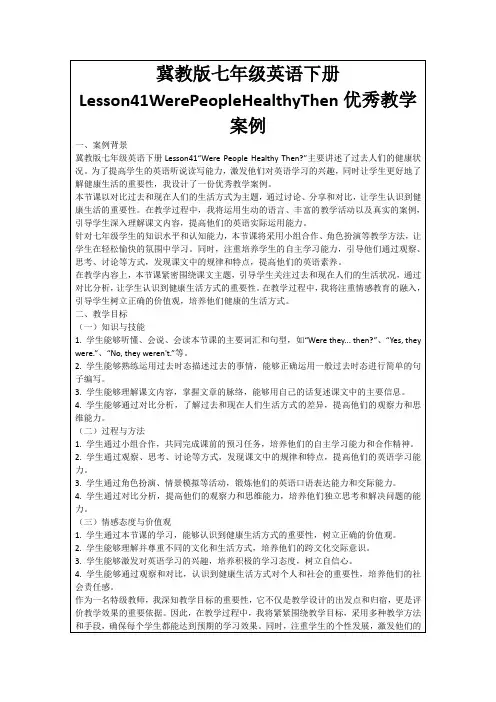
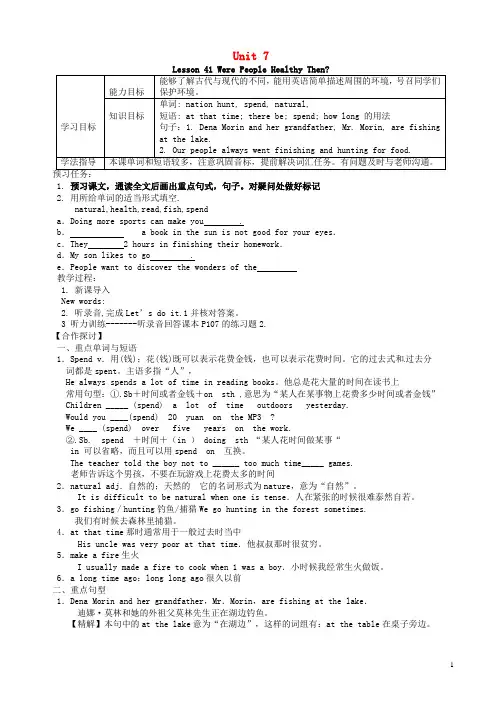
Unit 71. 预习课文,通读全文后画出重点句式,句子。
对疑问处做好标记2. 用所给单词的适当形式填空.natural,health,read,fish,spenda.Doing more sports can make you .b. a book in the sun is not good for your eyes.c.They 2 hours in finishing their homework.d.My son likes to go .e.People want to discover the wonders of the教学过程:1. 新课导入New words:2. 听录音,完成Let’s do it.1并核对答案。
3 听力训练-------听录音回答课本P107的练习题2.【合作探讨】一、重点单词与短语1.Spend v.用(钱);花(钱)既可以表示花费金钱,也可以表示花费时间。
它的过去式和过去分词都是spent。
主语多指“人”,He always spends a lot of time in reading books。
他总是花大量的时间在读书上常用句型:①.Sb+时间或者金钱+on sth ,意思为“某人在某事物上花费多少时间或者金钱” Children _____ (spend) a lot of time outdoors yesterday.Would you ____(spend) 20 yuan on the MP3 ?We ____ (spend) over five years on the work.②.Sb. spend +时间+(in )doing sth “某人花时间做某事“in 可以省略,而且可以用spend on 互换。
The teacher told the boy not to ______ too much time_____ games.老师告诉这个男孩,不要在玩游戏上花费太多的时间2.natural adj.自然的;天然的它的名词形式为nature,意为“自然”。
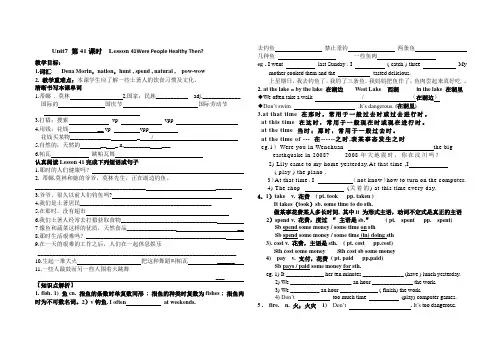
Unit7 第41课时Lesson 41Were People Healthy Then?教学目标:1.词汇: Dena Morin,nation,hunt , spend , natural , pow-wow2.教学重难点:本课学生应了解一些土著人的饮食习惯及文化。
清晰书写本课单词1.蒂娜. 莫林2.国家;民族___________ adj._____________ 国际的国庆节国际劳动节3.打猎;搜索vp vpp4.用钱;花钱__ vp vpp花钱买某物______________ _ /5.自然的;天然的__ _ n._________ ___6.帕瓦跳帕瓦舞认真阅读Lesson 41完成下列短语或句子1.那时的人们健康吗?2. 蒂娜.莫林和她的爷爷,莫林先生,正在湖边钓鱼。
______________________________________ _________3.爷爷,很久以前人们钓鱼吗?4.我们是土著居民_____________________________________________5.在那时,没有超市6.我们土著人经常去打猎获取食物_________________________________7像鱼和蔬菜这样的优质,天然食品_________________ __8.那时生活艰难吗?________________________________________________9.在一天的艰难的工作之后,人们在一起休息娱乐____________________________________________________________________10.生起一堆大火把这种舞蹈叫帕瓦______11.一些人敲鼓而另一些人围着火跳舞___【知识点解析】1. fish. 1) 鱼cn. 指鱼的条数时单复数同形; 指鱼的种类时复数为fishes ; 指鱼肉时为不可数名词。
Lesson 41 Snow ! It's winter !LESSON OBJECTIVESAfter this lesson, students should be able to1. understand the meaning of the text2. remember and use the mastery vocabulary and know some important words for making travel plans3. write something about planning a trip4. understand and write down some missing words as heard in sentences or passages in different contextsCLASS OPENING (5 MINUTES'IIntroduce the topic for Unit 6. See “Teaching Techniques” at the back of this teacher's guide for information abo ut introducing units.STUDENT BOOK (15 MINUTES)There is one reading for this lesson. The reading presents new vocabulary and reviews the vocabulary students have learned in previous lessons.The new vocabulary for this lesson includes the following words and phrases:Mastery Vocabularyenjoy yourself, have a good time, suitcase, travel0ral Vocabularybaggage, journey, luggage, pack (v.)There are many ways to teach immersion reading. Here are some step-by-step instructions for one way to teach the reading in this lesson. Also see “teaching Techniques” at the back of this teacher's guide for more general information about teaching readings.Step 1: Check to see if the students have previewed the text as required. You may ask them what places Brian, Danny and Jenny intend to visit.(The oceans, the mountains and cities like Toronto, Montreal and Vancouver.)Step 2: Play the audiotape. Have the class listen to the audiotape while looking at the textbook.Step 3: Ask three volunteers to play the roles of Jenny, Brian and Danny and act out the reading.Step 4: Divide the class into small groups. Ask each group to discuss and plan a trip around China. Instruct groups to make up a dialogue about their planned trip. Encourage the students to use words, expressions and sentence patterns from the text.Step 5: If you have time, have one or two groups perform their dialogues for the rest of the class.CLASS ACTIVITY: PACKING! (15 MINUTES)In this activity, the students talk about what they would pack for a long trip. This exercise reviews vocabulary about trips, and getting ready for them from previous levels. Here are some step-by-step instructions for this activity.Divide the class into small groups.Each group discusses what one person should take on a long trip. They must pretend that they only have one suitcase. Draw a box on the blackboard to show howbig the suitcase is (You can make it any size you want. A bigger suitcase may make students work hard to “fill” it. A smaller suitcase will provoke d iscussion about what a person really needs to take. )Each group makes a list of things to take and writes it down.With another group, each group talks about its list. The groups may question each other about their decisions. Did they forget anything important? They may add those items to their lists.If you have time, generate a list on the blackboard with suggestions from each group, one by one, until no one has any more suggestions. Will it all fit in the suitcase? If there is too much, ask the students to help you choose items to cross off.ACTIVITY BOOK (5 MINUTES)Play the audiotape. The aural exercises for this lesson are:1. Listen to the audiotape. Fill in the blanks. Write the words you hear.Jim and the DogJim was walking along the street. He saw a big dog. The dog saw Jim. Jim stopped walking.A woman was standing near the dog. “Excuse me,” Jim said. “Does your dog bite?”“No,” the woman said, “my dog doesn't bite.”Jim walked on. Then, the dog jumped up and bit him.“Hey!” Jim said to the woman. “You said your dog doesn't bite!”“It doesn't,” the woman said. “That's not my dog.”CLASS CLOSING (5 MINUTES)Below is the suggested homework for this lesson. Aim to give students about thirty minutes of homework. Use your discretion in deciding how much reading or how many exercises to assign as homework. Base your decision on students' progress.the first reading in the readerthe remaining activity book exercisesthe next lesson in the student book。
Lesson 41 Were People Healthy Then教学设计【教学目标】1.Master the words and phrases in the text.2.Understand the custom culture in foreign country【教学重难点】重点:the vocabulary and phrase 难点:understand the culture background knowledge 【课时安排】1课时【授课时间】2019年( )月( )日星期( )【教学过程】一、导入环节(2分钟)(一)导入新课,板书课题导入语:Good morning, class. How are you? Today, we are going to learn:Lesson 41 Were People Healthy Then(二)出示学习目标过渡语:First ,let’s read the learning goals together.1.我要掌握单词和句型:nation, hunt, spend, natural…go fishing, at that time…2.通过学习,我要了解相关异国风情文化知识。
过渡语:I believe everyone can achieve your goal? Can you ? Let’s begin .二、先学环节(15分钟)过渡语:First look at the guides carefully and then finish the tasks step by step.(一)出示自学指导1.熟记单词,完成自学检测(1)2.读课文,完成自学检测(2)和Let’s do it (二)自学检测反馈I.背写本课生词(英语、词性、汉语意思)(1)____________________(2)_____________________(3)__________________ (4)____________________(5)_____________________(6)__________________ Ⅱ.读课文,找出本课短语并翻译:1.go fishing/hunting 去钓鱼/捕猎。
Lesson 41 Snow ! It's winter !LESSON OBJECTIVESAfter this lesson, students should be able to1. understand the meaning of the text2. remember and use the mastery vocabulary and know some important words for making travel plans3. write something about planning a trip4. understand and write down some missing words as heard in sentences or passages in different contextsCLASS OPENING (5 MINUTES'IIntroduce the topic for Unit 6. See “Teaching Techniques” at the back of this teacher's guide for information abo ut introducing units.STUDENT BOOK (15 MINUTES)There is one reading for this lesson. The reading presents new vocabulary and reviews the vocabulary students have learned in previous lessons.The new vocabulary for this lesson includes the following words and phrases:Mastery Vocabularyenjoy yourself, have a good time, suitcase, travel0ral Vocabularybaggage, journey, luggage, pack (v.)There are many ways to teach immersion reading. Here are some step-by-step instructions for one way to teach the reading in this lesson. Also see “teaching Techniques” at the back of this teacher's guide for more general information about teaching readings.Step 1: Check to see if the students have previewed the text as required. You may ask them what places Brian, Danny and Jenny intend to visit.(The oceans, the mountains and cities like Toronto, Montreal and Vancouver.)Step 2: Play the audiotape. Have the class listen to the audiotape while looking at the textbook.Step 3: Ask three volunteers to play the roles of Jenny, Brian and Danny and act out the reading.Step 4: Divide the class into small groups. Ask each group to discuss and plan a trip around China. Instruct groups to make up a dialogue about their planned trip. Encourage the students to use words, expressions and sentence patterns from the text.Step 5: If you have time, have one or two groups perform their dialogues for the rest of the class.CLASS ACTIVITY: PACKING! (15 MINUTES)In this activity, the students talk about what they would pack for a long trip. This exercise reviews vocabulary about trips, and getting ready for them from previous levels. Here are some step-by-step instructions for this activity.Divide the class into small groups.Each group discusses what one person should take on a long trip. They must pretend that they only have one suitcase. Draw a box on the blackboard to show howbig the suitcase is (You can make it any size you want. A bigger suitcase may make students work hard to “fill” it. A smaller suitcase will provoke d iscussion about what a person really needs to take. )Each group makes a list of things to take and writes it down.With another group, each group talks about its list. The groups may question each other about their decisions. Did they forget anything important? They may add those items to their lists.If you have time, generate a list on the blackboard with suggestions from each group, one by one, until no one has any more suggestions. Will it all fit in the suitcase? If there is too much, ask the students to help you choose items to cross off.ACTIVITY BOOK (5 MINUTES)Play the audiotape. The aural exercises for this lesson are:1. Listen to the audiotape. Fill in the blanks. Write the words you hear.Jim and the DogJim was walking along the street. He saw a big dog. The dog saw Jim. Jim stopped walking.A woman was standing near the dog. “Excuse me,” Jim said. “Does your dog bite?”“No,” the woman said, “my dog doesn't bite.”Jim walked on. Then, the dog jumped up and bit him.“Hey!” Jim said to the woman. “You said your dog doesn't bite!”“It doesn't,” the woman said. “That's not my dog.”CLASS CLOSING (5 MINUTES)Below is the suggested homework for this lesson. Aim to give students about thirty minutes of homework. Use your discretion in deciding how much reading or how many exercises to assign as homework. Base your decision on students' progress.the first reading in the readerthe remaining activity book exercisesthe next lesson in the student book。